POINT
Think Globally, Act Locally
The aim of this course is that students will acquire a global view and be able to adapt to local requirements.
Program Description

Global Business
Management Course
Global Business Management Course has the studying abroad program for 4 months in the second semester of second grade. Students can acquire better English skills, communication skills, wider knowledge, and cultural understanding.

Regional Business
Management Course
Students can have a great experience at internships in companies, in government offices, and at NPOs for 15 weeks. There are a wide variety of internships: those involving retailing, lodging, education, welfare services and so on. Students work for 4 days at workplaces and get advice and feedback on campus from professors 1 day a week. Students will gain a sense of regional needs and practical skills as they play important roles in wide areas as “glocal” citizens.

Project Based
Learning Course
This course aims to develop human resources that can provide data-based solutions by utilizing knowledge and skills in research and analysis methods, management, and data science with global viewpoints. Students learn research and analysis and problem-solving methods for 15 weeks from the second semester of their second year, through actual assignments from local governments, companies, and other organizations in the prefecture. After practical learning, students improve their practical ability to solve problems by approaching society with actual issues; for example, submitting solution proposals to several Business Plan Contest.
Study abroad,
Internship, and
Project Based Learning
The Faculty of Business Administration offers three courses: the Global Business Management Course(GBM), the Regional Business Management Course(RBM), and the Project Based Learning Course(PBL).
In their second year, students can choose either the GBM, RBM, or PBL course. They then study abroad, have an internship, or project based learning for four months.
Long-term Internship
The Regional Business Management Course includes a 4-month internship program in the second semester of the second year. Students not only gain valuable work experience but also acquire communication skills and knowledge about how to deal with problems. Students can learn in and observe real workplaces in real time, which will help students in their choice of a future carrier.
67 companies and organizations support the internship
Shujitsu University has formed alliances with 67 companies and organizations. All partners are blue-chip companies and famous in Okayama. Therefore, students can learn about the regional economy and good management.
Study abroad
Shujitsu University has some partner universities around the world. Students who plan to study abroad will start preparation since the first year for 1.5 years as taking English 4 classes in a week to understand the classes in the partner universities. It is the compulsory course for 4 months. Students can improve their English skills and also acquire wide knowledge in the top level universities. So they will work as the global leader.
16 partner universities in 10 countries
Our alliance partners are excellent universities in Asia, Canada and the USA. Therefore, students have an unprecedented chance to interact with foreign students.
 California State University, San Marcos, California State University, Chico, University of Hawaii at Manoa[USA]
California State University, San Marcos, California State University, Chico, University of Hawaii at Manoa[USA] Canterbury Christ Church University[The UK]
Canterbury Christ Church University[The UK] Royal Roads University, University of Victoria[CANADA]
Royal Roads University, University of Victoria[CANADA] China Pharmaceutical University[CHINA]
China Pharmaceutical University[CHINA] Pukyong National University, Sangmyung University, Kyungsung University, Kongju National University[KOREA]
Pukyong National University, Sangmyung University, Kyungsung University, Kongju National University[KOREA] University of Adelaide[Australia]
University of Adelaide[Australia] Kasetsart University[THAILAND]
Kasetsart University[THAILAND] Udayana University[INDONESIA]
Udayana University[INDONESIA] Hue University[VIETNAM]
Hue University[VIETNAM] Massey University[New Zealand]
Massey University[New Zealand]


Four-month PBL
(Project Based Learning)
Every student in the Business Management Practice Course takes part in PBL in the second semester of their second year, in groups of around five students. Students address the issues raised by the partner companies and local governments in Okayama Prefecture from many different perspectives, exercise their creativity and ingenuity toward solutions, and propose new projects and business models based on these ideas. Through PBL, the students develop a proactive, creative, and collaborative attitude to explore and solve problems.
Seminar in a small group
through 4 years
Students can study in seminars from their first year. 1 professor teaches 4 or 8 students.
The content of seminars is diverse, depending on each professor’s research area or the academic year. Students have much time to communicate with their professor and seminar friends.
Seminars form the basis of student life.

student–teacher ratio of
6.0:1
Outline of English education
In their first year, students have 4 English classes each week.
A curriculum to improve English communication skills is offered,
to develop global leaders.
English learning
program-General English

At the Faculty of Business Administration, General English classes are taught by native English teachers every day.
There are 3 levels, based on student TOEIC scores.
Also, in the second semester, TOEIC content is taught through not only communication but also grammar lectures by native English teachers.
Communication skills will be developed in these year-long English programs.
English “to use”

At the Faculty of Business Administration, first-year students have English camp.
During this camp, students speak only English. The aim of this camp is that students will realize the difficulty and pleasure of using English, and that students will be motived to learn English. Even those who feel that they are good at English will find it difficult to communicate because of a lack of vocabulary and due to tasks to refine their skills through group work.
However, it is not too hard because there are some enjoyable activities and games.
CURRICULUM
Put a theory into practice,
Learn a theory from practice
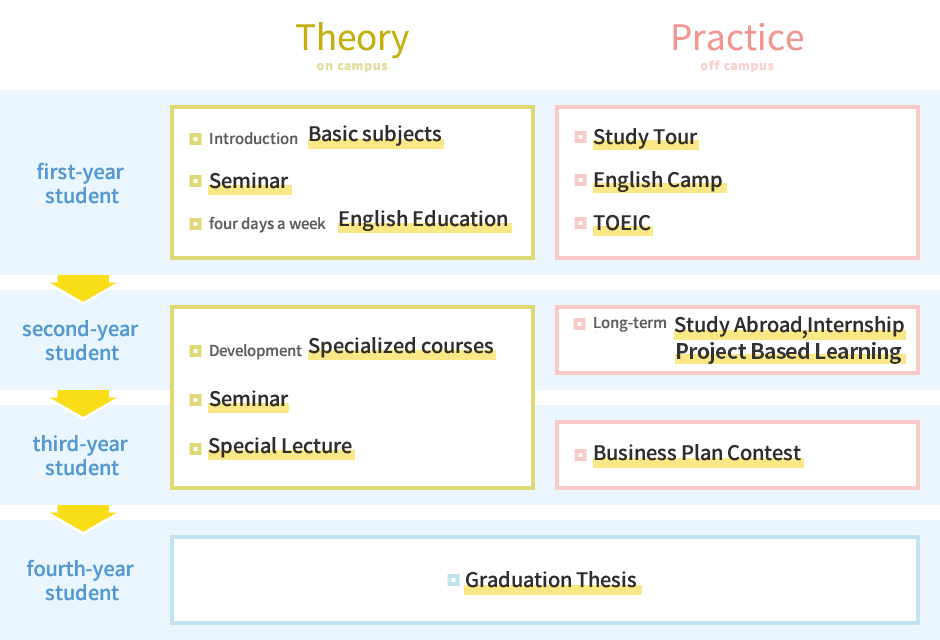
COURSES
Case of
specialized course
INTRODUCTION TO MANAGEMENT
BUSINESS STRATEGY
INTRODUCTION TO ACCOUNTING
INTRODUCTION TO INTERNATIONAL BUSINESS
MARKETING STRATEGY
TOURISM MANAGEMENT
SOCIAL STATISTICS
NEW PRODUCT DEVELOPMENT
SMALL BUSINESS
DEPARTMENT FACULTY
Message From
the Dean
Our Faculty of Business Administration aims to develop the fundamental human resources as society members living in communities, toward the goal to realize our educational philosophy, "cultivating ‘glocal’ human resources that can tackle and practice a wide range of social challenges with both global views and local perspectives".
To this end, we certify graduation for students who complete the required period of study stipulated in the university regulations, earn academic credits, and fulfill the following criteria.
1. Being able to fulfill the responsibility as a business professional in society.
2. Being able to understand and analyze complex social phenomena from diversified perspectives and to find solutions to them on their own.
3. Being a “glocal” human resource who can think globally and act locally.
In other words, we aim to develop human resources that can solve problems by finding challenges independently and gathering and analyzing information.
For these achievements, our faculty implements small-group education with active learning from the 1st to 4th year, and organizes curricula to develop logical and critical thinking and communication ability. The 2nd year is designed to recognize and experience a variety of social challenges through long-term internships, overseas study programs and Project Based Learning.
We at the Faculty of Business Administration welcome students who will actively and voluntarily take on wide-ranging social challenges through such educational programs.

Mamoru Fukumori
Professor
Data Science

Mitsutaka Aoyama
Associate Professor
Industrial Marketing
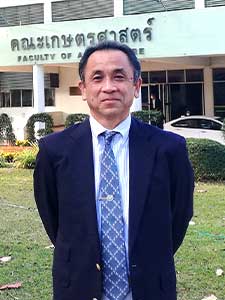
Haruhiko Iba
Professor
Rural economics

Wang Rui
Assistant Professor
Accounting

Ken Ohkura
Associate Professor
Production System

Yuichi Otsuka
Associate Professor
Business Ethics

Rieko Koyasu
Assistant Professor
Consumer Behavior

Tomohiro Koyanagi
Associate Professor
Business History

Junji Susa
Professor
Small Business Research and Business Administration

Arata Suzuki
Associate Professor
Management Accounting

Masayuki Senda
Professor
Agricultural Ecomoics

Yasukazu Hidaka
Professor
Organizational Behavior, Human Resource Management

Keisuke Hori
Associate Professor
Business Administration
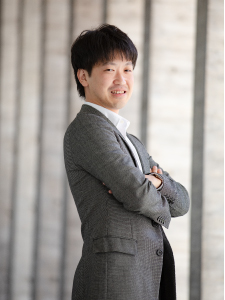
Kazuki Masuko
Associate Professor
Accounting

Tomokuni Mizunoue
Professor
Business Economics
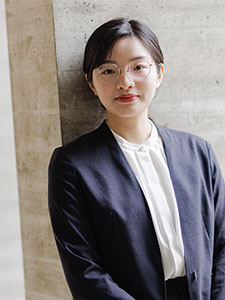
Qinxian Liu
Assistant Professor
Marketing

Yoshimitsu Miyama
Professor
Macroeconomics

Keiko Yamaki
Professor
Anthropology (in Business)
FACILITIES
The new building was completed in the spring of 2015.

i-café
Today, there are a wide variety of learning styles. The“i-cafe” has Internet connections and other tools for learning, which will help students to study in various ways.

agora
“agora” is a Greek word that means “gathering place”. As the Greek people discussed politics and learning there, students can study freely in this space.
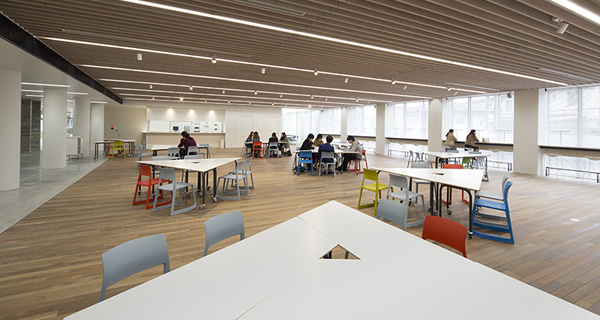
S-commons
The learning commons is an important area. Our new building has a “S-commons”. There is a meeting space, and study desks and presentation equipment, which students can use anytime.
CAREER
Civil servant, NPO, NGO, Foreign company, Business firm, Private company - international and regional enterprise - , Entrepreneur, Go to graduate school
Admissions
International exchange center











